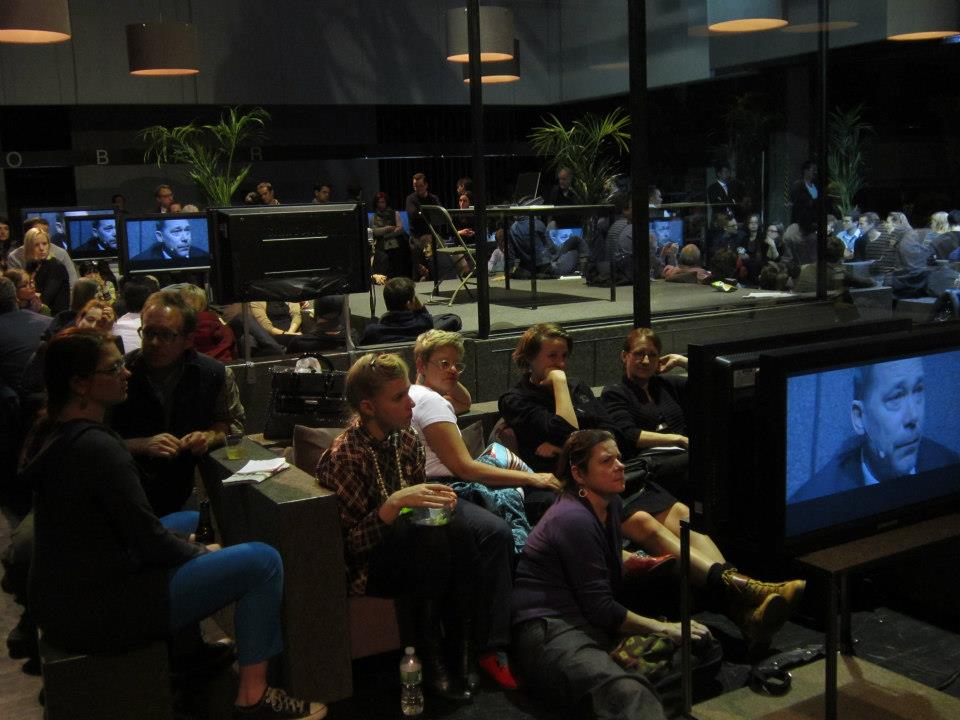I would say that last night I sat through six hours of Shakespeare’s three historically-based Roman tragedies – in Dutch, but in fact I did what I was invited to do and milled about. I lounged center-stage on a couch for the first scenes of Coriolanus, at one point dodging a flurry of papers tossed angrily into the air. The couch being a bit uncomfortable, I found myself a normal seat in the auditorium for the last part of that play, where I very much enjoyed the minute-by-minute countdown to the title character’s death. This was on the news scroll, which also informed us of the time remaining until the demise of other luminaries like Julius Caesar, Brutus and Mark Antony. Cleopatra’s date with the asp promised to make us tremble with anticipation for a full 200-minutes.
The fateful countdown (helpfully reiterated during breaks by the live announcer) was interspersed with tweets from the audience on things overheard in the restroom and the content of their onstage cocktails. Yes, onstage cocktails. To enhance my enjoyment of Julius Caesar, I made my way back to the stage, where I ordered a Scotch and soda and a curried chicken wrap from the bartender, taking in Brutus’ address to the shaken citizenry as I waited. Upon settling the bill, I turned from the bar and scanned the stage for a place to enjoy my repast. It looked rather like the lobby of a luxury hotel, TV screens everywhere, conversation pits, guests tossing their possessions here and there – and Toneelgroep Amsterdam’s ROMAN TRAGEDIES directed by Ivo van Hove fell abruptly into place.
The guests on the couches, against the rear wall, loitering in the aisles, drinks in hand, nursing their coffees, balancing their coats and handbags – were without exception glued to the television sets, rapt upon Antony’s oration to the crowd, lending him their eyes if not their ears, and into the scene before me spilled a recollection of all of those moments of national crisis in which the electronic media have united us – the assassinations, the 9/11s, the space disasters, the hurricanes, the wars, the sensational trials, the untimely deaths, the electoral cliffhangers. Of course Antony’s speech would be such a moment, when the everyday stopped, when all the distracted attention came to rest, uniting the watchers in shock, concern, cultural unity, and opinionated disagreement. This is the modern world, where, amidst great movements of history, we are atomized in the ordinary course by technology, ideology and economic stress, but still subject to those rare events that make the riven politic function as one.
It was something to see, all of those people hanging on Antony’s words as the subtitles worked their way across the screens; when I made my way to the mezzanine to see Antony and Cleopatra from a different perspective I noticed how the video live streams competed as though in a death struggle with the very performances that were being transmitted; and the concentration of the actors surrounded by so much bustle and unpredictability became all the more admirable to me. ROMAN TRAGEDIES is more than novel as a way to watch Shakespeare. It adapts to the limited attention spans of the age, to our multi-tasking, and tweeting, and checking-in (I tried, but it was one of Facebook for Android’s bad days), managing for all that to be intensely moving. But more important, it challenges us to take heed of those around us, to what is happening before our eyes, to value common experience, to pry ourselves together. That is why, I think, the audience was expelled from the stage for the final scene – to make us sit down, as a unit, just once, and pay attention, to the same thing, at the same time, in the same place.
For more on events at BAM, click here.

One response to “The Roman Tragedies”
[…] the pain of his Cries and Whispers, the angst of his Scenes from a Marriage, or the delirium of his Roman Tragedies. Those were, each of them, formally challenging, and in their way distancing, but intensely […]